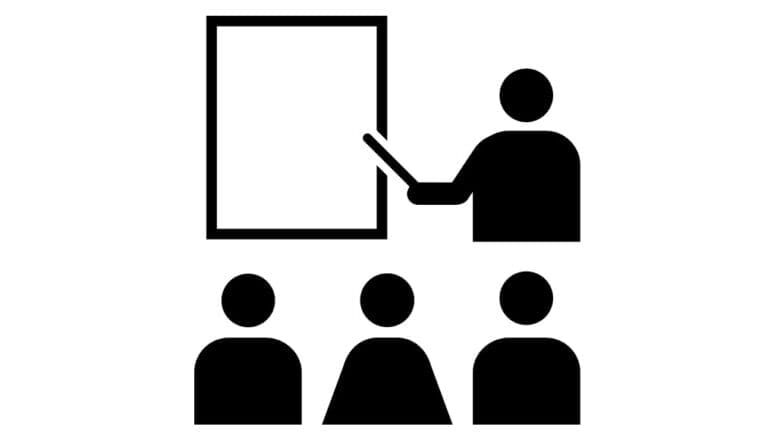By Hannah Watson (Watson is a senior at Kennesaw State University)
- Georgia’s four-year graduation rate increased to 84.4%, which had never occurred since 2011
- Georgia teachers raised the state’s graduation rate by using relationship-building and motivational behavior in the classroom and by participating in programs that support at-risk students
- Teachers prepare students to be “college-and career-ready” by presenting relevant and “life-changing” content to students
HAMPTON, Ga.— When Richard Postell was named the Henry County 2023 Teacher of the Year inside the McDonough Performing Arts Center on Oct. 5, 2023, he wasn’t only thinking about his new honor. As he accepted a bouquet of fresh flowers and Henry County Superintendent Mary Elizabeth Davis called him the “champion of champions,” the echo of a bigger issue blared in the back of his mind.
Amidst bright purple and gold lights and cheers from an enthusiastic crowd, Postell reflected on his mission to ensure the success of all students, including the many “bubble students” who fall short of graduating.
“I accept the honor,” Postell said. “It’s a huge honor. However, I don’t teach just for the sake of educating. It doesn’t suit me well as a teacher to know that a student didn’t achieve the greatness within themselves.”
In carrying out his “moral mission” to help all students, Postell uses specific methods and standards alongside his motivation to help students achieve academic success in the classroom and graduate.
However, Postell is not alone. According to the Georgia Department of Education, he is one of many teachers whose efforts helped to raise Georgia’s four-year high school graduation rate to 84.4%, an unprecedented high in the state’s educational history since it began using an “adjusted cohort calculation system” in 2011.
“Let’s Get This Success”
Postell, a Dutchtown High School economics teacher with 20 years of teaching experience, can identify the exact approach he uses to generate success for all students. He said his approach, which prioritizes students’ mental health, ensures that students are confident in their abilities and adequately motivated.
“In my classroom, I start off by saying ‘I’m not going to allow you to fail,’” Postell said. “I pull a student in the hallway and say, ‘I’m looking at the work you’re turning in…tell me why you are struggling to get this work done’ instead of degrading them. Sometimes it’s an issue at home or a lack of focus, but we [Postell and his students] have that dialogue that says, ‘let’s get this success.’”
Postell also said supporting “at-risk students” is an important aspect of generating student success.
“Students walk into school buildings carrying book bags full of burdens,” Postell said. “Sometimes these things [only] come across as at-risk, but these students also have underlying issues. I always want to be empathetic, compassionate and mostly patient when dealing with at-risk students.”
According to Concordia University Irvine, “at-risk students” are learners who are “at risk of not meeting academic or social expectations or of not graduating from high school.” They need “extra support and resources to succeed in school and reach their full potential.”
Research reveals that when at-risk students do not receive support, they are significantly impacted. According to the National Center for Education Statistics, in 2021, 2 million at-risk students ages 16-24 dropped out of school across the U.S. In their lifetime, U.S. high school dropouts experience lower paying jobs, higher risks of poverty and shortened life expectancy.
Nicole Shaw, the principal of Dutchtown High School, said Postell and other Dutchtown High School teachers take extensive measures to ensure that at-risk students are supported and receive an opportunity to graduate.
“She [the Dutchtown High School graduation coach] takes seniors who are at-risk of graduating and assigns them with a caring adult in the building,” Shaw said. “All of us [Dutchtown High School teachers and administrators] are assigned seniors to help them cross the finish line. We meet with our seniors and follow them along the way. We give total wrap-around services for them academically and mentally. We give them everything they need in order to make it.”
“Run Through a Wall”
While Postell’s teaching approach focuses on supporting all students, he also said his approach is powered by developing positive relationships with students. In fact, he said that his “relationship-building approach” is a necessary aspect of classroom success.
“I consider myself a coach in the classroom and on the football field,” Postell said. “When players know that you care for them, that you genuinely love them for who they are as people, they’ll run through a wall for you. It’s the same thing in class.”
Stephanie Gordy, the executive director of the Griffin Regional Educational Service Agency which provides “educational leadership and support” to Georgia schools, said that teachers who use positive relationship building see more academic success and higher graduation rates.
“When students feel connected to their teachers and peers, they are more likely to engage in learning, participate in class and persist through challenges,” Gordy said. “Relationships increase engagement, motivation, social-emotional skills and ultimately higher graduation rates through building efficacy, trust, mentoring and accountability. The saying that a person doesn’t care what you know until they know that you care is foundational to building these relationships with students.”
Termerion McCrary-Lakes, the Chief Learning & Performance Officer for Henry County Schools, agreed that developing relationships with students is an important approach that teachers utilize.
“All students must be seen…no student should be sitting in their class unnoticed,” McCrary-Lakes said. “Developing relationships are a big part of increasing graduation rates.”
Postell said that he often uses his love for Christmas to humanize himself and develop positive relationships with his students.
“My kids [Postell’s students] know I love Christmas,” Postell said. “They’ll ask me every day how many days until Christmas, and I can tell them to a tee…It’s building that relationship to get the kids to buy into who you are and what you’re giving them. They have to know who you are.”
Life-changing “Opportunities”
Although Postell has seen his “relationship building” approach translate to higher graduation rates, McCrary-Lakes said that graduation rates are also impacted by the opportunities teachers provide students through the presentation of high-quality content.
“When teachers create an environment for highly effective learning, students receive the opportunity to be college-and career-ready,” McCrary-Lakes said. “In Georgia, students are provided with many pathways that prepare them for the real world.”
According to the GDOE, the Georgia Career Clusters program provides all Georgia high school students with the opportunity to choose from 17 career areas to learn the “relevance of what they’re learning in the classroom…”
While the GDOE provides “college-and career-ready” programs, Gordy said that teachers across Georgia use specific techniques to ensure educational content promotes college-and career-readiness for students of all abilities, including those who have dyslexia and audio and visual impairments.
“Every division and team member at Griffin RESA works to support educators across our state with the resources and skills necessary to help all students be college-and career-ready,” Gordy said. “We [Griffin RESA officials] provide guidance for growth using relevant resources to encourage excellence for sustainable skills in advancing achievement.”
McCrary-Lakes said that Georgia’s recent graduation rate increase also occurred because teachers are dedicated to ensuring that educational content is relevant to students, even if they have to conduct interventions and tutoring sessions before and after school hours.
Postell, who uses interventions such as question analysis assignments, agreed that making content relevant to students is important to their success.
“We [teachers] have to make content relevant to students,” Postell said. “This allows them to make a connection to the content. I like to know that I’ve tapped into their personal lives.”
The “Champion of Champions”
By dedicating himself to educating all students, Postell has shown that teachers impacted Georgia’s recent graduation rate increase. Their efforts involved the implementation of unique practices and standards, even during non-school hours. However, by the calm resolve and consistently enthusiastic tone of Postell’s voice, it is obvious that the “champion of champions” will never give up on his “moral mission.”

Hannah Watson is a Senior Journalism and Emerging Media student at Kennesaw State University. As a Georgia native, she has been exposed to Georgia’s legendary news scene which inspired her to pursue journalism. Actively, Hannah’s goal is to unveil the diverse views and lifestyles of those within society and effectively inform all who will listen. She is also a creative writer, bookworm and lover of music.



